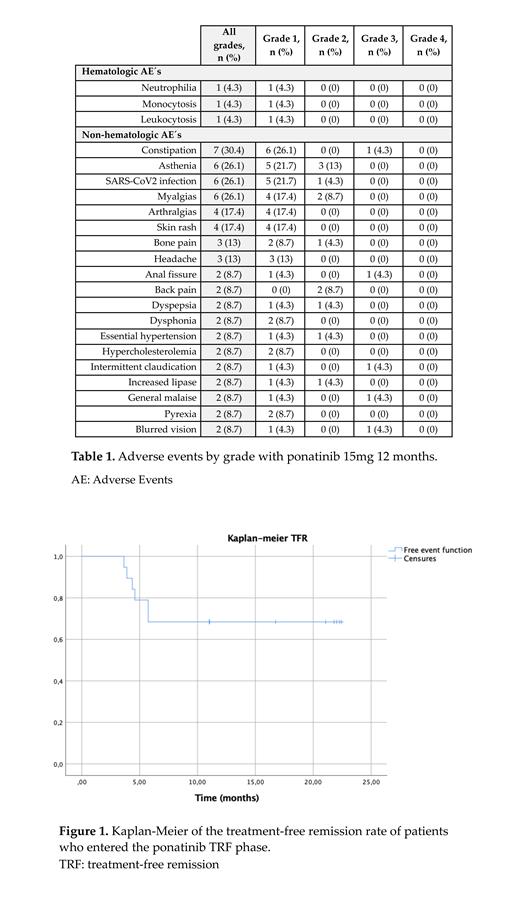Introduction: Discontinuation of tyrosine kinase inhibitors (TKIs) in chronic myeloid leukemia (CML) has become part of routine clinical practice in recent years, thanks to growing evidence on their feasibility and safety. However, and despite adequate patient selection based on current recommendations, loss of response is observed in approximately 50% of patients. In this scenario, efforts are focused on finding strategies to increase the rate of successful discontinuations. Ponatinib has shown to induce deeper molecular responses compared with imatinib, but its risk of arterial occlusive events (AOE) limits its use in first line at its standard dose of 45mg. The risk of AOEs appears to be dose-related and following the results of the OPTIC study, dose reduction to 15mg in patients with good response is an increasingly popular strategy. Under these premises it has been postulated that a consolidation with ponatinib 15mg may increase the proportion of patients who could discontinue treatment successfully.
Our aim is to evaluate the efficacy and safety of one year of consolidation therapy with ponatinib 15mg on treatment-free remission (TFR) rate in patients with CML who have achieved a deep molecular response with imatinib.
Material and Methods: A multicenter open-label, single-arm, phase II, exploratory, prospective clinical trial (NCT 04043676) was conducted including patients with philadelphia-positive CML who met discontinuation criteria according to European LeukemiaNet recommendations, had received 4 years or more of imatinib therapy, with a documented grade 4 molecular response (MR4) at least 12 months prior to study entry. Uncontrolled arterial hypertension, active cardiovascular disease, or concomitant medication with potential for QTc prolongation were exclusion criteria. The study has two main phases: ponatinib consolidation (48 weeks), and ponatinib TFR phase (48 weeks); where patients remain without treatment. During the TFR phase, patients with a confirmed loss of MR4 or a single value above major molecular response (MMR) were scheduled to restart treatment with a TKI at investigator's discretion. The present abstract reports the results of the primary endpoint of the study; the proportion of patients with no loss of MR4 at the end of the TFR phase.
Results: A total of 23 patients started treatment with ponatinib 15mg. One patient subsequently failed screening due to a major protocol deviation. Baseline patient characteristics were as follows: median age was 51.8 years (range 26-74), 65.2% were male. Ninety-five percent were Caucasian and 5% were Hispanic, ECOG was 0 in 83% and 1 in 17%, Sokal was low in 69.5%, intermediate in 17.5% and unknown in 13%. Eighteen patients were receiving imatinib 400mg daily (82%) at study entry, 2 patients 800mg and two 200mg. Median time on prior imatinib was 10 years (range 4-17), with a median time on MR4 of 3.6 years (range 1.9-13.3). Prior to initiation 13 patients (56.5%) had a grade 5 molecular response, 4 had a 4.5 molecular response (26%) and the remainder had a MR4. The adverse events (AEs) reported with ponatinib are summarized in Table 1, the most frequent being constipation (30%), asthenia (26%), myalgias and arthralgias (26% respectively) and skin rash (17%). A high rate of SARS-CoV2 infections was reported during the treatment period (26%), which should be interpreted considering that the study took place during the COVID-19 pandemic. Three patients out of 22 (13.6%) had serious AEs with ponatinib leading to treatment discontinuation; thrombophlebitis, erectile dysfunction, and intermittent claudication. Of the patients who entered the TFR phase, 14/19 (74%) continue with MMR without requiring treatment after a median follow-up of 12 months (68% with MR4) (table 1). Six patients (31%) lost MR4, five of them required reintroduction of an TKI (4 imatinib, 1 dasatinib; median time to reintroduction 5.4 months). All patients with MR4 loss were receiving the 400 mg dose of imatinib at study entry. All patients who restarted treatment recovered MMR. The sixth patient lost MR4 while maintaining an MMR without requiring treatment reinduction to date.
Conclusions: Consolidation with 12 months of ponatinib 15mg in this study shows a high discontinuation success rate with an adequate safety profile, although not free of AEs. The results make this approach attractive for the design of further randomized clinical trials.
Disclosures
Pérez-Lamas:Incyte: Other: Travel grants; Novartis: Other: Travel grants. Hernandez Boluda:Pfizer, BMS, Incyte, and Novartis: Membership on an entity's Board of Directors or advisory committees. Ayala:Novartis: Consultancy, Speakers Bureau; Incyte: Consultancy; Astellas, BMS: Speakers Bureau. Ferrer Marin:INCYTE BIOSCIENCES INTERNATIONAL SARL: Honoraria, Research Funding; Novartis Farmaceutica SA: Honoraria; Celgene S.L.U: Consultancy; CTI BioPharma Corp., a Sobi company: Research Funding. Orti:Incyte: Consultancy, Honoraria, Research Funding; Pfizer: Consultancy, Honoraria; JAZZ: Honoraria; Novartis: Honoraria; BMS: Honoraria. Jimenez Velasco:Novartis: Membership on an entity's Board of Directors or advisory committees; Incyte: Membership on an entity's Board of Directors or advisory committees. Martinez Lopez:BMS: Membership on an entity's Board of Directors or advisory committees, Other: Travel grants, Research Funding; Incyte: Membership on an entity's Board of Directors or advisory committees, Research Funding; Pfizer: Membership on an entity's Board of Directors or advisory committees, Other: Travel grants, Research Funding; Sanofi: Membership on an entity's Board of Directors or advisory committees, Other: Travel grants, Research Funding; Janssen: Membership on an entity's Board of Directors or advisory committees, Other: Travel grants, Research Funding. Garcia Gutierrez:BMS: Membership on an entity's Board of Directors or advisory committees, Research Funding; Novartis: Membership on an entity's Board of Directors or advisory committees, Other: Travel grants, Research Funding; Incyte: Membership on an entity's Board of Directors or advisory committees, Other: Travel grants, Research Funding; Pfizer: Membership on an entity's Board of Directors or advisory committees, Research Funding.


This feature is available to Subscribers Only
Sign In or Create an Account Close Modal